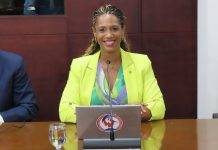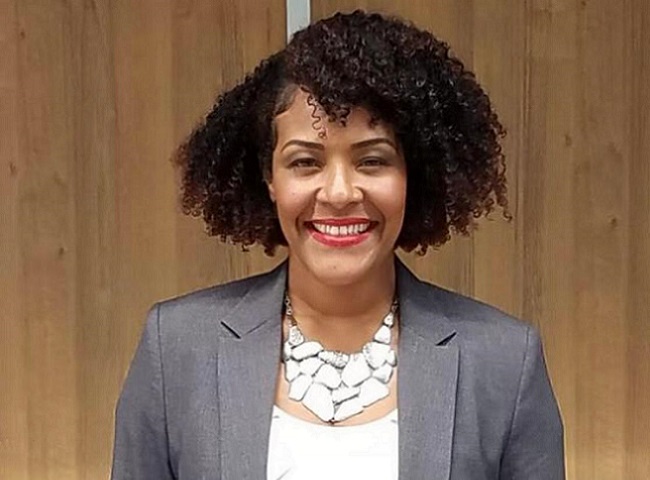PHILIPSBURG, Sint Maarten — On Thursday, April 18, 2022, Independent Member of Parliament S. Ludmila Duncan submitted a request to the President of Parliament to invite the Minister of Education, Culture, Youth and Sports (ECYS) to a public meeting to discuss the recent Education Review Interim Report.
On July 21, 2022, while on recess, the Parliament of St. Maarten received the Interim Report of the St. Maarten Education Review from Minister of ECYS, Rodolphe Samuel. In March 2022, the Interim Report had been completed based on research and analysis that was conducted by the St. Maarten and Netherlands Education Inspectorates respectively .
“This Interim Report described several, very serious challenges and bottlenecks including the ‘lack of adequate information to enable relevant professionals to set priorities and steer a course towards improvement in education.’ It also warns of the case that our Ministry of Education is ‘steering in the fog’ due to the lack of performance indicators. This troubles me deeply but it doesn’t surprise me. The Ministry of ECYS has always consisted of hard working and dedicated staff but due to an absence of true vision from the Minister, there appears to be a continuous lack of tangible outcomes. Additionally, what I believe is extremely urgent at this time is the opportunity for Parliament and the general public to ascertain the status of actual programs, projects and pending policies aimed at solving these issues, ahead of the final report,” stated Duncan.
In the problem analysis section for Recommendation 4, the authors stated that “the relationship between the education sector including teacher training and the labor market is often limited and incoherent. Except for internship contracts, it is frequently characterized by a lack of structural consultation between vocational education and the business community regarding the final attainment levels and course curricula.”
According to the MP, “difficulties regarding the connection between vocational education and the labor market have existed for quite some time now. As a policy advisor at the Department of Education in 2018, I was a member of the local Caribbean Vocational and Trade (CVET) Workgroup established by the vocational schools with the intention to actively work on the advancement of the sector on St. Maarten. In 2018, the workgroup attended a CVET Conference in Saba and discussed the possible transition to the use of CXC’s ‘CVQs’; used in many other Caribbean islands. The Caribbean Vocational Qualification or CVQ, is a competency-based approach to training, assessment, and certification. Students are expected to demonstrate competence in attaining occupational standards developed by specialists, industry experts and employers. At the conference, the St. Maarten delegation presented a video, which is available on my Youtube channel, highlighting the great potential at our schools but also showcasing a united front in the approach to improving the system. Since then, sadly, the workgroup was disbanded, and no tangible progress was made in regards to advancing vocational and technical curricula.”
The Interim Report also recommends that a system in which companies are recognized as training companies according to clear criteria is established as well as the number of traineeships available are increased.
“Students in the vocational streams depend on internships to successfully complete their secondary education. At some schools, the job training programs are quite successful according to what I have heard; students get good reviews about their service. For other programs this may not be the case. Additionally, the report states that the Department of Tourism and two hotels indicated that preparatory and advanced secondary vocational education institutions do not cater for the needs of the tourism sector. Why is this still the case for our main industry? I would like an elucidation of this finding as well as a plan of approach,” added the MP.
“I am calling on the Minister of ECYS to also make the State of Education Report available to the public for the purposes of transparency and accountability. Why not allow the people of St. Maarten the opportunity to see not only the work that has been done stemming from the Country Reform packages but also understand the education sector’s current challenges?”
In the problem analysis section for Recommendation 9 “the working group noticed that stakeholders raised concerns about basic conditions for good education. This means that our students and teachers, especially in public education, are being forced to learn and work in facilities, in conditions that are not up to par. When are we seriously going to address issues affecting infrastructure, technology as well as the adjustment of salaries in education?”
“What some of our leaders fail to understand is that trying to keep these dilemmas a secret is counterproductive to solving them. I believe in a participatory approach to policy making. It doesn’t only happen in the Government building but also on the ground, in the schools and even abroad. Solving the challenges in education will take an ‘all hands on’ deck and it starts first with honesty and openness about what’s going wrong,” noted Duncan.
“I am patiently awaiting the scheduling of this meeting. I am sure that the Minister will want to wait on the final report to appear in Parliament. Parliament and the people of St. Maarten, however, deserve to be informed not only of the research findings but the concrete plans and measurable outcomes to be expected once the recommendations are implemented,” concluded the MP.






























